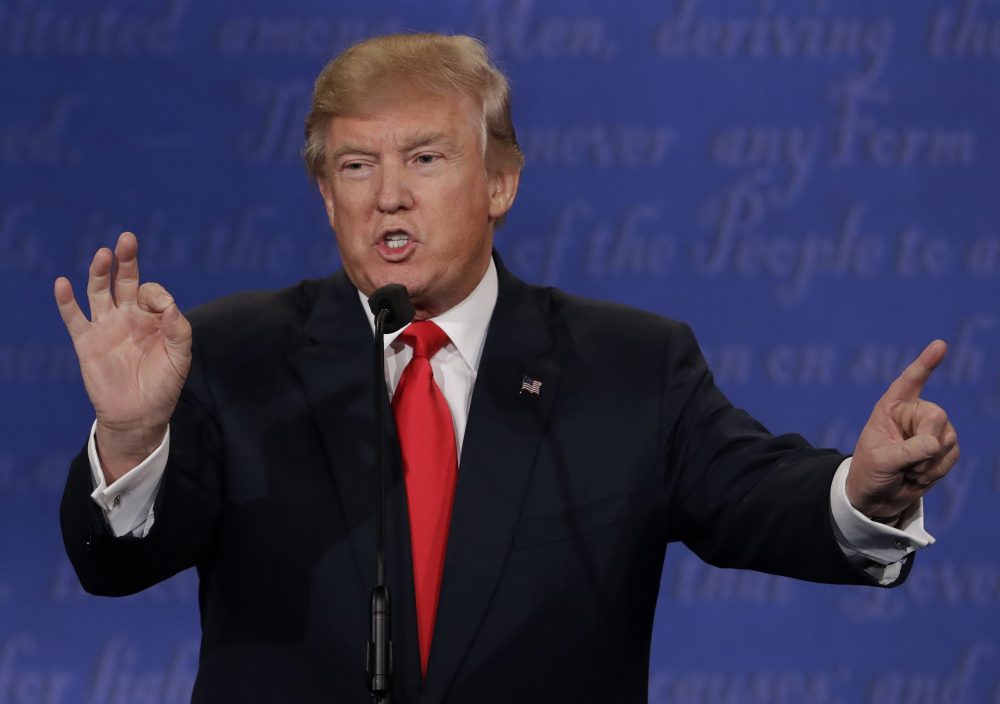Advertisement
What Trump's Warnings About A 'Rigged Election' Say About The Integrity Of The Vote

As he launches heated attacks against his opponent, Republican presidential nominee Donald Trump is also attacking the media and the U.S. election system.
"We're going to make history together. Remember, it's a rigged system. It's a rigged election," Trump said to a crowd in Portsmouth, New Hampshire, last weekend. And he had a similar message that same day in Bangor, Maine, where he accused the media of being biased against him: "It's a rigged system. And they take these lies and they put them on front pages."
In Colorado Springs on Tuesday, he made allegations of voter fraud: "But they even want to try and rig the election at the polling booths, where so many cities are corrupt, and you see that, and voter fraud is all too common. And then they criticize us for saying that."
He continued that line of attack in Wednesday night's final presidential debate, refusing to say if he'd accept the outcome of next month's election.
Moderator Chris Wallace: "For the good of the country, are you saying you're not prepared now to commit to that principle?"
Donald Trump: "What I'm saying is, I'll tell you at the time. I will keep you in suspense."
Hillary Clinton: "Well, Chris, let me respond to that because that's horrifying."
Among Trump's allegations: that large numbers of non-citizens are voting, that people who are deceased are still listed as eligible voters, and that in several cities, including Philadelphia, many people might have voted more than once in 2012.
It's a message that at least some of his supporters in Massachusetts are taking to heart.
"Everybody is concerned that elections could be rigged," said Patrick Walsh, a Trump supporter from Boston, adding that he thinks voting rules are too lax.
"You don't even need an identification anymore to register to vote," he said. "I think that the rules should be stricter. I am not at all concerned that Mr. Trump is saying that this is something against democracy, but we need the system to be checked so it's fair and that people's votes count."
Advertisement
Another Trump supporter who agrees is Lou Murray, a member of the Trump leadership team of Massachusetts. Murray recalled what happened four years ago when he ran his brother's campaign for county attorney in New Hampshire.
"In a town of 7,000 people, we had 700 same-day registrations in Conway, New Hampshire," Murray said. "I mean, how does that happen? My brother lost the election by 660 votes. You know, I scratch my head and say, 'Something wasn't right there.' "
Maybe not. But Trump's specific charges have been largely debunked.
Here's just one example: His campaign points to a 2014 study that found more than 6 percent of non-citizens voted in 2008. But election experts say the study used a flawed data that relied on people responding to an internet survey. Election experts say there are occasional and isolated examples of voting irregularities, but there is no evidence of the kind of widespread voter fraud which Trump talks about that could swing a national election.
"What we know about voter fraud in the United States in the last half-century, at least, is that it's an extremely rare phenomenon," said Alex Keyssar, a professor of history at Harvard who studies elections and author of "The Right to Vote." "There is study after study after study indicating that this is a tiny, tiny, tiny problem."
Keyssar says the big challenge around voting rights isn't fraud, it's laws that suppress voter turnout — like voter ID laws — which are pushed by Republicans and have the biggest impact on minorities and older, poor, white voters. He said laws like these will likely take more votes away from Clinton than from Trump.
Keyssar is among those who say Trump's claims of large-scale voter fraud are dangerous.
"What he is doing is setting up his supporters to be angry and feel cheated," Keyssar said. "That can be a dangerous outcome in the wake of an election."
Adding fuel to such concerns are Trump supporters at rallies who talk of revolution and coups. Sheriff David Clarke of Wisconsin tweeted out recently, "It's pitchforks and torches time."
But Trump supporter Murray, of Boston, dismisses concerns like these — and says fears that Trump's allegations will incite violence are unfounded.
"It's like through the looking glass," he said. "We have the Republican Party headquarters in one of the major rural counties of North Carolina being firebombed. I don't see the Trump people coming into the streets with revolution after the vote. I see the Clinton people acting with violence and disregard for the law right now, right in front of our very eyes."
Both the Clinton and Trump campaigns have condemned the bombing, which remains under investigation. But Murray says Trump's heated rhetoric about election fraud is part of a careful effort by the candidate to excite his base to vote — not to be violent.
On Thursday, Trump continued to press his case, telling supporters in Ohio that he'll "totally accept the results of the election" if he wins.
This segment aired on October 21, 2016.
